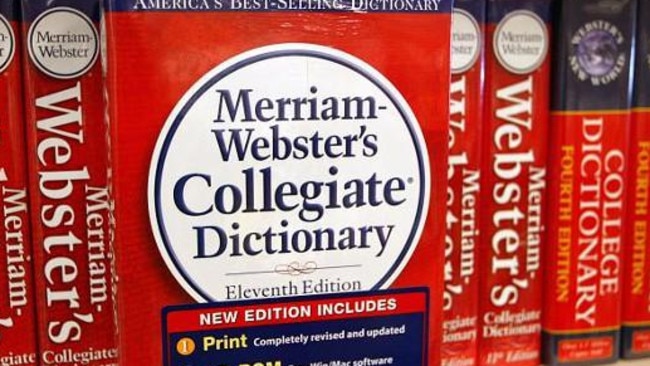How Merriam-Webster’s dictionary is trolling the Trump administration
SINCE the election, Merriam-Webster’s dictionary has gone from that dusty old book on your shelf to one of Donald Trump’s cheekiest trolls.

ONCE UPON a time, Merriam-Webster’s dictionary was that dusty old book you hadn’t pulled out since Google’s launch in 1998.
But with the rise of Donald Trump, the publishing company has been transformed into a sassy political commentator.
Over the past few months, the online brand has taken to “fact-checking” statements made by members of the Trump administration.
Earlier this week, the President’s top adviser Kellyanne Conway was asked about feminism.
Speaking at the Conservative Political Action Conference, she said she sees the term “feminist” as being very “anti-male” and “pro-abortion”.
She then offered up her own definition of the word: “There’s an individual feminism, if you will, that you make your own choices ... I look at myself as a product of my choices, not a victim of my circumstances. That’s really to me what conservative feminism, if you will, is all about.”
Later that day, Merriam-Webster reported that searches for the term “feminism” had spiked following Ms Conway’s remarks, and offered up this tweet:
📈'Feminism' is defined as "the belief that men and women should have equal rights and opportunities." https://t.co/Zjf7CAPUjL
— Merriam-Webster (@MerriamWebster) February 23, 2017
Ordinary on its own, but in the context of Ms Conway — and with the link to the article about her? Sassy as hell.
It’s not the first time the publishing company has hit out at the Trump administration.
When Ms Conway’s “alternative facts” gaffe went viral last month, they put out a cheeky tweet to remind her of the definition of the word “fact”:
📈A fact is a piece of information presented as having objective reality. https://t.co/gCKRZZm23c
— Merriam-Webster (@MerriamWebster) January 22, 2017
*whispers into the void* In contemporary use, fact is understood to refer to something with actual existence. https://t.co/gCKRZZm23c
— Merriam-Webster (@MerriamWebster) January 24, 2017
Shortly after Mr Trump’s inauguration, stories emerged around the enthusiastic applause when he visited CIA headquarters.
It was later revealed that many of those in attendance were not actually CIA staff, but Trump supporters invited for the occasion.
He also reportedly hired actors to applaud during the announcement of his candidacy.
The dictionary pointed out that searches for the term “claqueur” spiked during this incident.
If you're part of a group that's paid to applaud, you're a 'claqueur'. https://t.co/EX96vGLGDz
— Merriam-Webster (@MerriamWebster) January 24, 2017
They also pointed out that lookups for the term “misogyny” spiked after the President’s election victory last November.
📈 Lookups for 'misogyny' spiked after Trump's victory. https://t.co/Y1nrjCce4S
— Merriam-Webster (@MerriamWebster) November 10, 2016
Last month, the dictionary’s editor Kory Stamper told CNN that it’s ultimately just good fun.
“I can tell you that that persona is entirely our social media manager, Lauren Naturale,” Stamper said, saying it just reflects “the natural voice of how we talk to each other in the office. It’s the jokes we make to each other”.
While the searches are widely applauded by anti-Trump social media users, Stamper insists the dictionary is an objective reference book.
“A lot of the people who looked up the word fact, particularly who left comments or wrote to our office, wanted to make sure we weren’t going to change the definition,” she said.
“We’re not going to change the meaning of the word ‘fact’ just because of the way one person uses it,” she added. “We’re trained to pull words out of a jar and just tell the truth about what they mean. So we’ll keep doing what we do.”
When Vox spoke to Lauren, the social media manager, she similarly said the tweets merely reflect the personality of the office.
“It reflects the personalities of the people who work here: wildly enthusiastic about language, jokey, friendly, but nobody’s fool,” she said.
“There’s also a kind of egalitarianism-without-anti-intellectualism which has been part of Merriam-Webster’s identity since before Twitter was invented. That’s the idea that the editors here have specialised knowledge and training — they’re experts — but they know that it’s their job to be experts and that it doesn’t make them better than people in other fields, who know all kinds of things we don’t know.
“Smart people are curious about the world, and smart people are curious about the other people who live in that world. Our Twitter reflects that attitude.”



